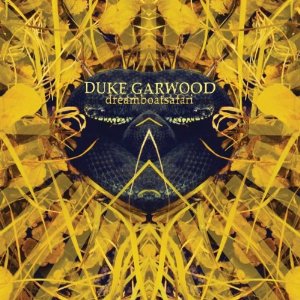I first encountered Duke Garwood late last year, when he supported Howe Gelb at Cafe Oto. Garwood played on his own, with just his voice and an electric guitar. I was almost immediately captivated, and you shouldn’t use that kind of word lightly. The combination of Garwood’s murmured vocals and the sounds he gets out of his guitar – which ranges from a rolling, loose finger-picking to shuddering howls of feedback – had a hypnotic effect.
The same feeling stalks Garwood’s new album Dreamboatsafari, where his vocals and guitar are supported by the quite brilliant drumming of long-time collaborator Paul May, as well as a host of organs, drones and, equally significantly, the sound of the room in which it was recorded. For Dreamboatsafari is the product of home-recording sessions, and nearly every element of its aesthetic is informed by that decision. In this respect, Garwood shares something with label-mates Howe Gelb and Giant Sand, in that, when it comes to getting sounds down onto tape, they pursue a tactic that, for want of a better word, might be termed realism. The effect of this technique is to give Dreamboatsafari a startling immediacy, even in its most woozy moments, of which there are many. Listening to ‘Flames of Gold’ is like peering into a private world; where a scratchy guitar wanders at will, kept at bay by Garwood’s murmured vocals and some strange rattling sounds that skitter across the surface. It’s a very disorientating listen, not least because of the piercing hi-hat that occasionally cuts through, loudly asserting that this is live, real, documentary.
This sense of immediacy is furthered by the brevity of many of the tracks, and both these factors combine to great effect in ‘Summer Gold’, a gorgeous pop song composed of only a warm fuzzy guitar and some up-front drums that is here and gone in just over two minutes. This awareness of time lends even the most exploratory tracks a sense of purpose. ‘Tapestry of Mars’ is an avant-jazz instrumental -all squak and rumble – that without warning coalesces into a huge guitar hook, for all of ten seconds. It has the structure of a well-planned joke.
Duke Garwood is nearly always referred to as ‘blues’, and it’s a testimony to his singular approach that he is not called ‘neo-blues’ or – and the brain lurches at the thought – ‘alt-blues’. But the point is that, although it echoes Beefheart’s take on the blues (and Trout Mask Replica in its title?), this is clearly not just ‘blues’. The Casiotone beats and hovering synth atmospheres of ‘Gold Watch’ make that perfectly clear. Moreover, despite what that might suggest, this is no exercise in genre-clashing, or any attempt to combine the old with the new – a good thing since conscious attempts at that nearly always age ungraciously. It doesn’t come across as a conscious attempt to do anything at all, just the fragmented, textured recordings of two people playing in a room. Dreamboatsafari will age just fine, because it is already gloriously anomalous music.
Dreamboatsafari somehow sidesteps all those arguments about what is ‘retro’ what is ‘contemporary’ and what is ‘authentic’. This surely has something to do with the wilfulness of the album, that it doesn’t stick around long, that it appears un-thought and yet definitive at the same time, and with the warmth and simplicity of the recording.


